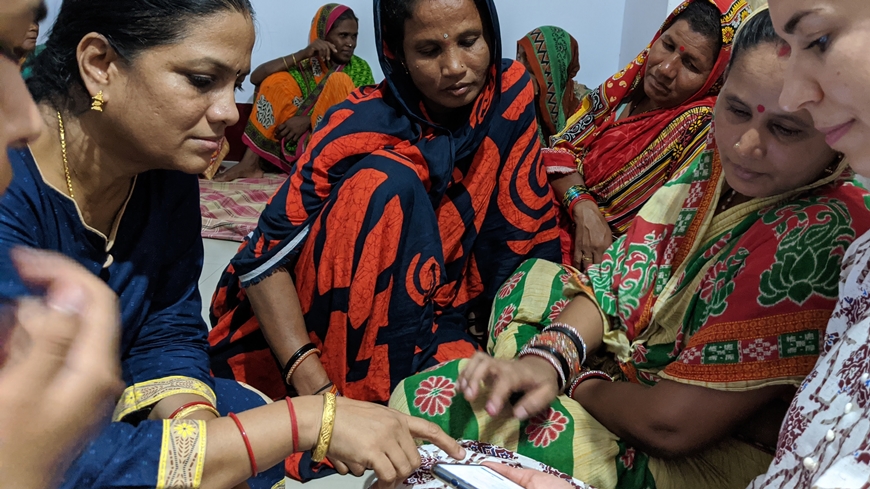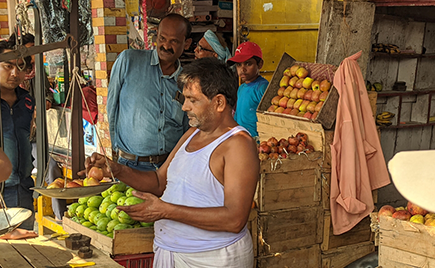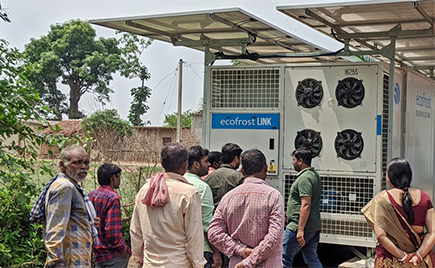Sustainability
Virtual cold chains save food

Fighting food waste, in other words, has the potential to be a force multiplier for social impact. And that’s exactly what the Basel Agency for Sustainable Energy (BASE), together with Empa is working to accomplish through data science for social good – working with communities to fight food waste while lifting the livelihoods of small farmers and simultaneously driving investment in climate change solutions.
The Challenge
Digitalization
The success of that effort, known as the Cooling as a Service Initiative, sparked new ideas and illustrated new challenges. “There’s a lot we can do beyond the business model. We realized that tailoring this to the agricultural cold chain is a key piece of the puzzle to address food security. By integrating digitalization, we facilitate the adoption of the model by local entrepreneurs as well as its scaling-up”, says Thomas Motmans, senior sustainable energy finance specialist and the project lead at BASE.
The extensive experience of Empa researchers, led by Thijs Defraeye, with analyzing and reducing food loss in post-harvest supply chains as well as with physics-based modeling to predict fresh produce shelf life showed to be highly synergetic to extend the solution to the agricultural cold chain.
Thus, BASE and their partners at Empa launched an interdisciplinary consortium for a deep dive into the problem of food waste, starting in India, one of the world’s largest food producers. As much as 35 percent of the fresh food produced in India is wasted, largely due to a lack of proper refrigeration. In fact, only 6 percent of the country’s food moves through the cold chain, compared to about 60 percent in developed countries.
Through the project, Your Virtual Cold-Chain Assistant, BASE and Empa are enabling a business model in which farmers can access cooling services on a pay-per-use basis, and have developed a mobile application, that facilitates the implementation of the model. The open-access, data science-based mobile application uses machine learning and physics-based food modeling to provide smallholder farmers with actionable post-harvest and market intelligence.
Operators of cold rooms

While initially, BASE and Empa conceptualized the solution to be used by farmers only, it became clear in early, local conversations that the operators of cold rooms would become important users of the app and that some farmers without access to smartphone technology might be excluded. They started to rethink the approach and co-create the solution together with the users.
This resulted on the one hand in adding the operators of cold rooms as primary users and on the other hand in enabling the communication of data by these cold room operators to the cold room users via SMS messages for those farmers, or members of farmers’ households, having access only to feature phones. “It’s really important to understand who will be using the app, engage with them to collect feedback, and ensure the solution is tailored to technical capability and infrastructure,” says Roberta Evangelista, sustainability data science and digitalization specialist for BASE.
BASE’s used their connections with cold room operators to roll out the pay-per-use model in partnership with three local cooling providers – CoolCrop in Himachal Pradesh, Koel Fresh in Odisha, and Oorja in Bihar. Under this business model, farmers gain access to solar-powered cooling while only paying for the amount of food they store per day in the cold rooms. This makes cold chain storage more affordable for smallholder farmers in the process. Service providers who own, maintain, and operate the cooling facilities are incentivized to think long-term and use efficient systems.
Tracking shelf life from remote

With the post-harvest and market intelligence that it provides, the application makes data science actionable for farmers. “We call it upcycling,” says Thijs Defraeye, leader of the Simulating Biological Systems group at Empa’s Biomimetic Membranes and Textiles lab. “We translate the data into useful recommendations for the people on the ground."
The app sensors capture data points like temperature and humidity – information that on its own may not be helpful to a farmer – and transforms them into usable indicators. For instance, the solution helps smallholder farmers remotely track the shelf life of their crops in storage based on real-time sensor data. In future, the app will even be able to forecast daily market prices for different commodities using open-source data from markets across India. “From the perspective of the farmer, the main benefit of the app is that they will receive real-time information about when the produce in storage is reaching the end of life, which combined with market price forecasts means that they can better leverage cooling to achieve better prices in the markets," explains BASE's Roberta Evangelista.
Currently, when food outside of the cold chain is reaching the end of its shelf life, farmers are often forced to distress sell it at significantly reduced prices or waste it, a financial hit to their business. Your Virtual Cold Chain Assistant enables them to leverage cooling as a solution to delay the decay of perishable produce, store leftover products overnight before they can sell at full price the next day, and better plan when and where to sell their produce to maximize their income.
Pilot projects were launched in India in partnership with the three local cooling companies, and the efforts are already being expanded to Nigeria, with plans to expand to yet further geographies.
This Impact Story was originally published on data.org.
Biomimetic Membranes and Textiles
Phone: +41 58 765 4790
thijs.defraeye@empa.ch
Amanda Caracas
Communication
Phone: +41 58 765 60 59
redaktion@empa.ch
-
Share






